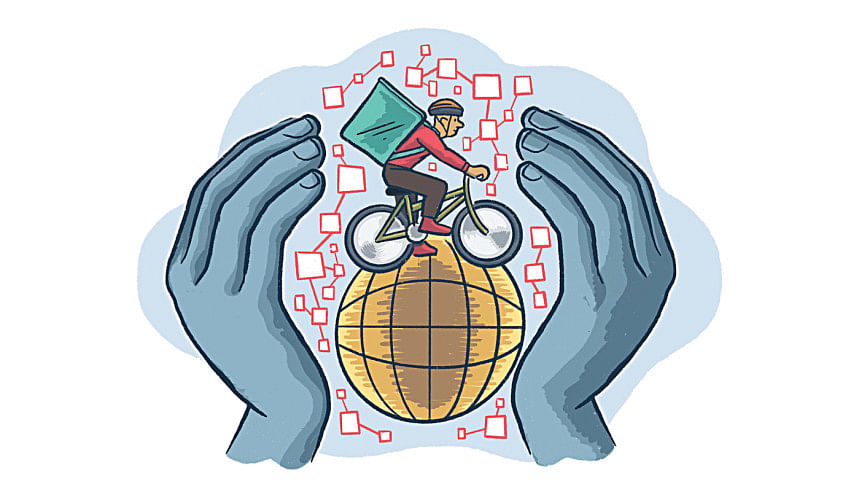Legal reforms for workers of the gig economy

The gig economy, notably via platforms such as Uber, Pathao, and Foodpanda, has created new possibilities and constraints in the labour markets across various countries, including Bangladesh. However, Bangladesh's primary labour law— Bangladesh Labour Act 2006 (BLA), was enacted before the rise of these digital and platform-based employment. This dated law ignores gig workers' working circumstances, denying them the essential rights and protections afforded to conventional employees.
The BLA governs workers' rights but does not include protection for gig workers. According to section 2(65) of the Act, a worker is any person, including apprentices, irrespective of whether the terms of his employment are expressed or implied, who works in any institution or industry, directly or through contractor, in exchange of wages or money for any skilled, unskilled, physical, technical, etc. Workers in the gig economy, such as ride-hailing drivers, delivery drivers, and freelancers, do not fall under this categorisation since there is no official employer-employee relationship. Without such a connection, gig workers are arguably ineligible for basic protections such as minimum wage, sick leave, health insurance, and employment security.
While countries such as Australia, the United Kingdom, and India have made strides in recognising gig workers' rights, Bangladesh has yet to take steps to ensure the legal protection of its platform workers. A comparative discussion on this matter will be helpful.
The Fairwork report "State of Work in the Bangladesh Gig Economy: Bangladesh Ratings 2022" by the Oxford Internet Institute has shown that many gig workers in Bangladesh earn less than the minimum wage after subtracting fuel and maintenance costs. As a result, these platforms have drawn criticisms for providing substandard working conditions and low compensation. This concerning situation needs to change urgently.
While countries such as Australia, the United Kingdom, and India have made strides in recognising gig workers' rights, Bangladesh has yet to take steps to ensure the legal protection of its platform workers. A comparative discussion on this matter will be helpful.
The Code on Social Security 2020 in India promotes the recognition of gig workers. This law recognises gig workers as participants in the platform economy and offers a variety of advantages, including welfare programs. However, the practical conditions of gig workers in India are still quite concerning. In the UK, the Supreme Court recently has ruled that Uber drivers should be considered "workers" under UK law, providing them with limited employment rights. Uber drivers were classed as employees since they rely on the platform for employment rather than being independent contractors. Additionally, Australia's attitude to gig employment is also evolving. According to the latest developments, the gig workers, being deemed as employee-like workers, are granted certain rights, and the Commission has recently announced a 3.5% increase to minimum wages starting 1 July 2025. Unfortunately, Bangladesh is yet to take any steps in this regard.
The exploitative tactics prevalent in the gig economy in general worsen the situation. For instance, in an article published in The Guardian on 11 January 2025, many gig workers must pay significant fees to access their earnings quickly. Similar exploitative practices are present in Bangladesh as well. Workers often face financial difficulty due to fees connected with obtaining their pay since they lack essential job rights such as paid sick leave, insurance, and minimum wage.
Bangladeshi gig workers have often complained about their compensation and revenue access fees, calling for better legal protections. However, the legal uncertainty surrounding the status of gig workers in Bangladesh impedes their protection. Bangladesh's disregard for these legal loopholes has also had negative consequences, with gig workers experiencing the most severe unfair working conditions.
According to a World Bank study from 2023, Bangladesh's gig economy generated 5% of GDP in 2020 and would continue to double by 2025. Legal changes that acknowledge gig workers' rights may increase productivity and attract new enterprises. Hence, Bangladesh must update its labour legislation to reflect the reality of the gig economy. A third legal categorisation for workers, known as dependent contractors or flexi-workers may be formed, with separate rights and benefits from those of ordinary employees. Fundamental safeguards such as a minimum wage, healthcare, social security, and accident insurance may guarantee that gig workers are not left vulnerable in a society increasingly dependent on their labour.
The writer is lecturer at the Department of Law, World University of Bangladesh.

 For all latest news, follow The Daily Star's Google News channel.
For all latest news, follow The Daily Star's Google News channel. 



Comments